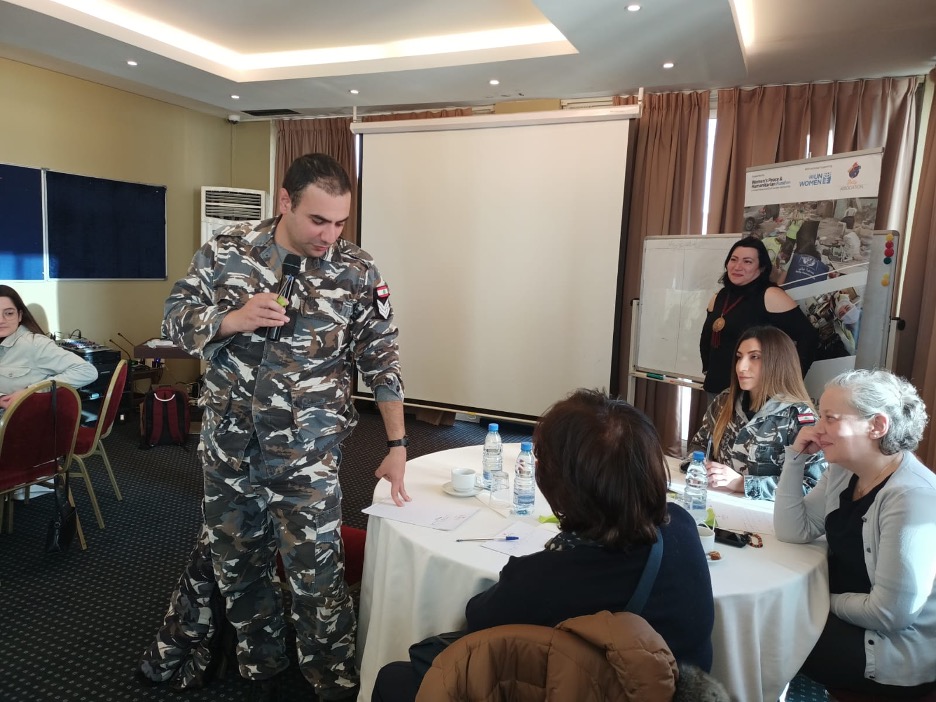In Lebanon, Police and female community members are supporting each other to reduce disaster risks
Date:
On August 4, 2020, Major Fadi Touma, Commander of the Gemmayze Police station, was an early responder to the impact of Beirut Port Blast. At home, in Jezzine, south Lebanon at the time of the explosion, he rushed back to a heavily affected Gemmayze to assist in the response.
Committed to being better prepared for disasters in future, Major Fadi Touma and his platoon participated in the ‘Disaster Management Accountability’ project, which brought together ISF members and women affected by the Beirut Blast to develop disaster management improvement plans. The project was led by civil society organization Auberge Beity, funded through the United Nations Women’s Peace and Humanitarian Fund (WPHF) by the Government of Germany, with technical support provided by UN Women.

Major Touma has admired the work of the Internal Security Forces (ISF), the national police and security force, from an early age. “People from different backgrounds would reach out to them because they believed they could help them solve conflicts and achieve justice. I wanted to help others too; I wanted to support community members to fight for their rights.”
Throughout his 17 years of service in the ISF, he has experienced difficult times. Yet he describes the four months that followed the Beirut Blast as, ‘a living hell’. “When the Port explosion first occurred, we rushed to the streets to search for those missing, rescue people stuck under debris, and help others out of collapsing buildings. The situation was chaotic. We helped carry the injured to hospitals and arrested looters.”
Prior to the explosion, the police department in Gemmayze did not have a gender-specific disaster response plan. In its aftermath, they did not have the time or resources to think about how to respond in a way that addressed gendered needs and protection risks. They did however notice that over 70% of volunteers and NGO workers helping in the emergency relief were women. “It was astounding. Women did an excellent and fast job as front-liners in humanitarian aid when the explosion happened. We realized they are a resource and support system we need to plan for. Therefore, we were very excited to collaborate with Auberge Beity to plan for women’s participation in disaster management.” In doing this, the Gemmayze and Naher Police Stations cooperated with the Civil Defense and civil society organizations to discuss and exchange experiences and expertise for better crisis management in the future. “I very much believe in the impact of this work, and I think it should be extended to the national level,” he noted.
The work done by Auberge Beity under this project brings police members, female community members from Gemmayze and Naher and women’s rights organizations together to discuss how they can all support each other in disaster response and management. Through this they developed solid gender inclusive plans, integrated into existing disaster management plans, that serve women, men, boys and girls and their communities in the event of crisis.
Nour Ghanimeh, 30, is a lawyer and activist. Along with 18 businesswomen, elderly people and activists, she participated in five exchanges with the police and civil defense. “There is a lack of awareness in terms of crisis by both civilians and security officers. We did not know who to report damage to during the blast response, and when we reported, the police did not have the resources to respond at the speed we expected.”
The sessions have created a safe space for civil society and security officers to find discuss community issues related to crisis and disaster response, find common ground, and develop solutions that meet the expectations of both. “When everyone participates in making decisioning, everyone feels encouraged to abide by them. Thanks to these meetings, we are developing joint plans that will make it easier to respond to disaster, together as police members, civil society organizations, and women.”
For Lisa Tabet, 80, she now feels safer living in her house in Gemmayze after attending these sessions. Lisa was at her sister’s house, a few streets away, when the explosion occurred. “I was lucky to have been outside my house during the blast, or else I would have died. My house was in ruins.” She rushed home immediately, only to see that everything in her apartment - the glass, wood, doors - broken. “I did not know who to contact and what they might do to help, and I did not know if the police would come to my aid if I called them.” Having attended the sessions, she now understands the resources on offer from the police, and they understand what she expects from them.
“I now know what to expect from them and that they will help me if I need help. We are connected more than ever; I even invited them over for coffee this week!”
Through the Auberge Beity project, Major Touma hopes to develop the concept of community policing. “Community policing encourages community members to engage with security work, so they feel more engaged in the safety of their neighborhood,” he explained. “In tandem, security members will also engage with the community through social services. The strength of this project is that now we know more than the faces of our neighbors, we know their stories, needs, and concerns, and they know ours. This creates a safe neighborhood that is ready to respond to any disaster.”
Through the Women Peace and Humanitarian Fund, Auberge Beity’s project “Women’s participation in disasters management accountability” sought to bring together the Internal Security Forces, the Civil Defense, and civil society organizations to strengthen the response to crises in two areas affected by the Blast, Gemmayze, and Mar Mkhayel.